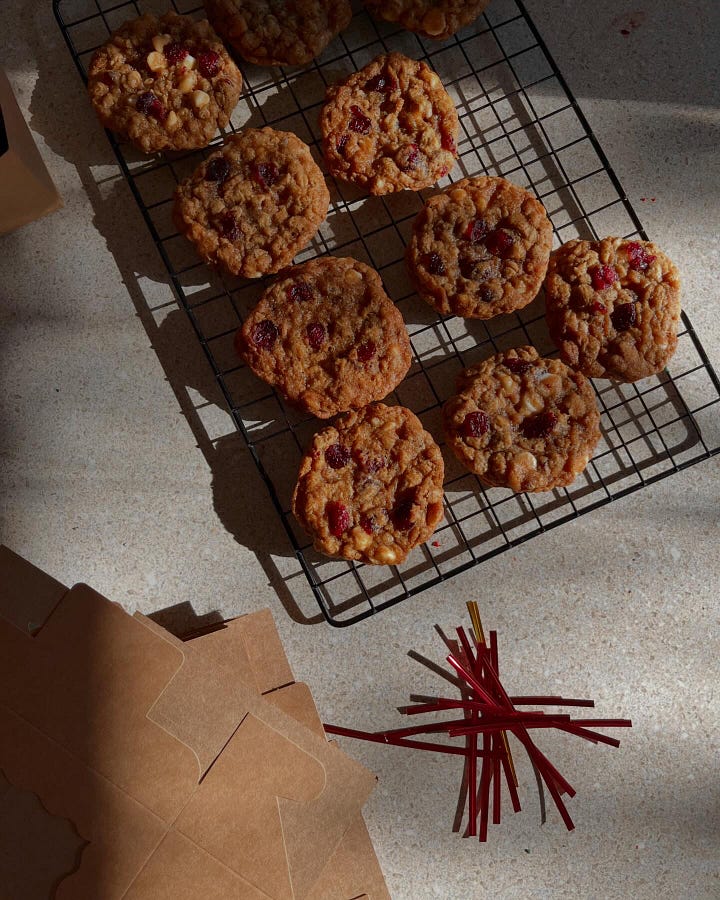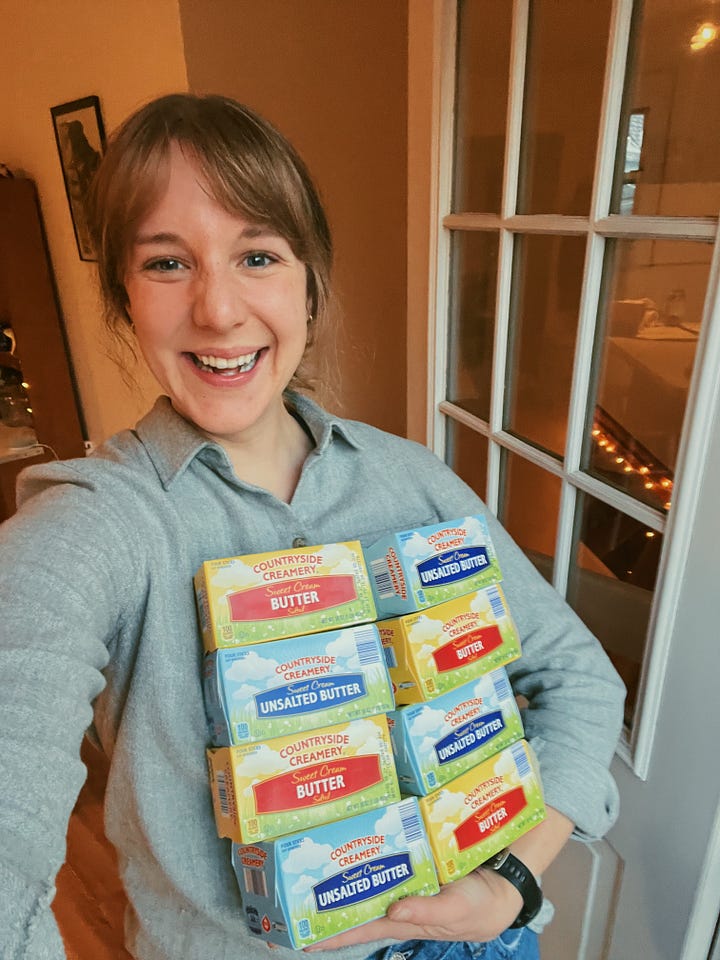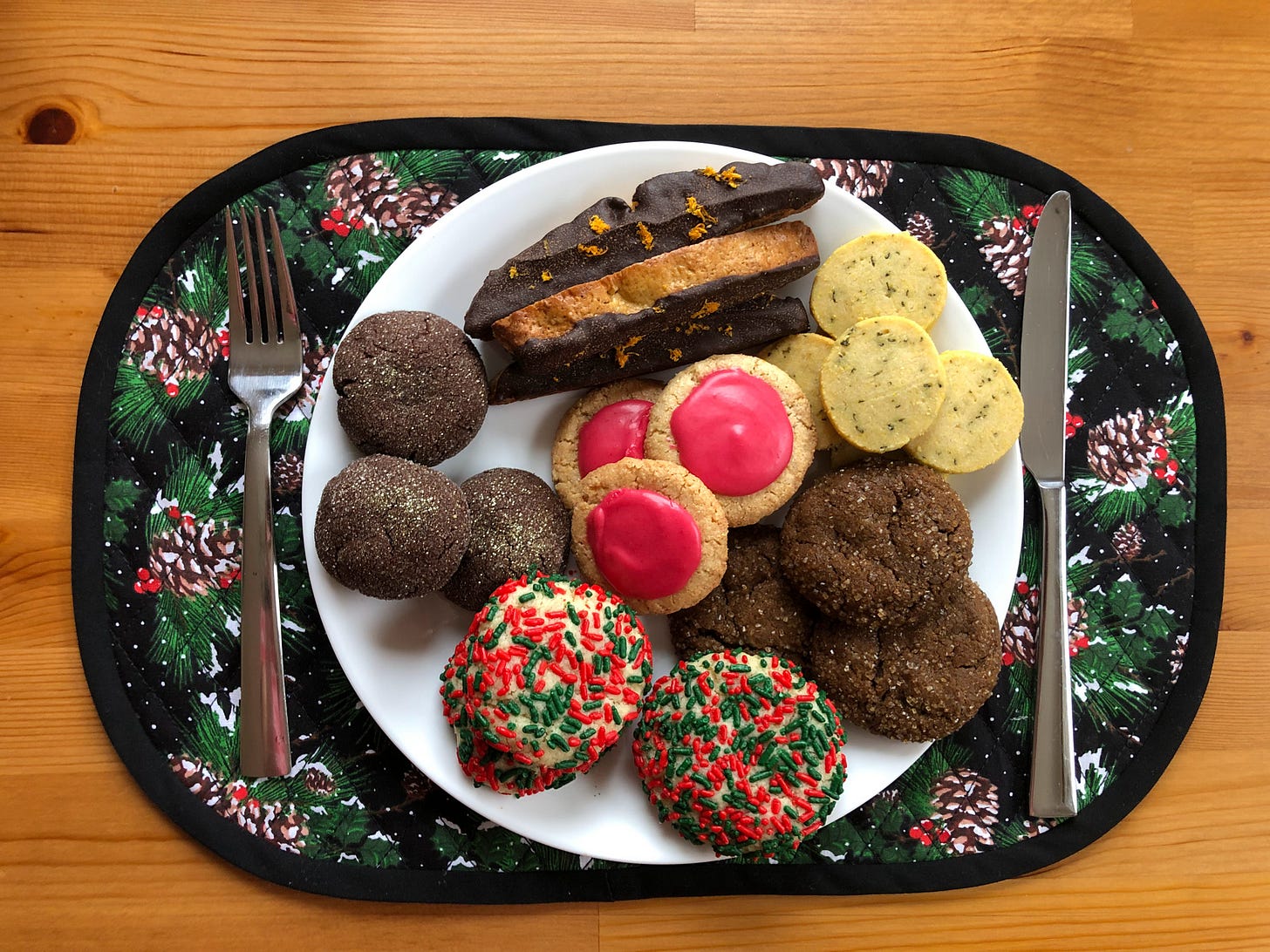If you like baked goods, Robert Farrar Capon, and discussions about alternative spiritual gifts, this essay is for you. This essay first appeared in Advent 2022 for Mockingbird, and it’s one of my favorite essays I’ve ever written. It might sound silly, but writing an essay about butter helped me realize that baking and enjoying meals with others is a way I not only connect with God and love the people around me, but experience the love of Christ as well. I hope you enjoy.
Growing up, my dad dearly loved five things: Jesus Christ, his family, the Pittsburgh Steelers, Sunday afternoon naps, and butter. As a child of the nineties, our family’s table and my diet could’ve easily excluded butter. It was the era of Brummel and Brown and I Can’t Believe It’s Not Butter (Disclaimer: anyone who has tasted actual butter Can Believe That It’s Not Butter.) But not in our house. We ate the real stuff.
Butter was spread on slices of bread, plopped onto piles of rice, and melted on mounds of fresh green beans dished out at those daily family dinners. Butter held together the cinnamon-y crumble topping on my grandma’s Dutch Apple Pie that she made each Thanksgiving. Butter was in the cookies my mom baked each week, packed in pairs in our school lunches. Now, as an adult making my own traditions, butter (last year’s tally was ten pounds) is the central ingredient in the hundreds of Christmas cookies I bake each year.
The first year, I made a simple Swedish butter cookie recipe of my grandma’s, dipped in dark chocolate and decorated with holly sprinkles. The second year, I got bolder — cookies covered in a grapefruit glaze, one dusted with edible gold glitter, another studded with bittersweet chocolate chunks and browned butter. In the years that followed, I’ve made thousands of cookies. I’ve had plenty of mishaps — burned cookies and under-baked others, made some too salty and others too sweet. But I’ve also had triumphs — cookies stuffed with peanut butter, layered with salted caramel, flavored with tahini and sprinkled with sesame seeds. Cookies that were chewy, crunchy, soft, salty, citrusy, fruity, and of course, buttery.


I wasn’t always this way— a baker, connoisseur of cookies, and butter advocate. I had essentially zero experience in the kitchen when I graduated from college. But the summer after I graduated, partially out of necessity and partially out of curiosity, I began to cook and bake in earnest. I made ricotta gnocchi with cherry tomatoes that I grew on my back deck. I seared chicken on a questionably-sanitary propane grill and served it with pico de gallo. I browned meatballs, simmered them in a spicy sauce, and served them over a burned pot of rice. I even tried making an omelet, but accidentally dumped an entire jar of pepper into it (some dishes, I’ve learned, are best left to the professionals). And of course, I made cookies.
My pastor at the time, Charlie, took note of my budding love of cooking and baking and introduced me to Robert Farrar Capon’s iconic book The Supper of the Lamb: A Culinary Reflection. Charlie was an excellent cook and host himself — inviting groups over for dinners of roasted vegetables topped with fresh herbs, loaves of crusty bread with a bowl of salted butter, and salads that were crispy and funky and better than I knew a salad could be. With Capon’s help and Charlie’s example, I began to understand why meals mattered — why it wasn’t too far-fetched to say that butter was, in fact, my love language, and cookies, my spiritual gift.
For Capon, cooking is far more than mere utility, perhaps the greatest gift we experience this side of heaven:
Real eating restores a sense of the festivity of being. Food does not exist merely for the sake of its nutritional value. To see it so is to knuckle under still further to the desubstantialization of man, to regard not what things are, but what they mean to us — to become in short solemn idolaters spiritualizing what should be loved as matter. A man’s daily meal ought to be an exultation over the smack of desirability which lies at the root of creation. To break real bread is to break the loveless hold of hell upon the world, and, by just that much, to set the secular free.”
To me, there is no ingredient that invokes “a sense of the festivity of being” more than real butter. While a solitary eater can certainly consume butter, I think it’s an ingredient best suited for company. Spread on a loaf of bread shared amongst friends, swirled throughout a thick layer of buttercream atop a birthday cake, baked into a batch of biscuits dunked into mugs of midday coffee. Butter might not have as much nutritional worth as say, brussels sprouts, but what butter has to come to mean to me is full of value. To me, butter — real butter — tastes like love, like family and fun and celebration and care.


While Christians are routinely told to avoid the pitfalls of consumerism and gluttony that come with the Christmas season, it’s important to note that the act of consuming can also be a moment of spiritual practice. As Wendell Berry writes in Bringing it to the Table: On Farming and Food:
A meal, according to my understanding anyhow, is a communal event, bringing together family members, neighbors, even strangers. At its most ordinary, it involves hospitality, giving, receiving, and gratitude.
In other words, “food does not exist merely for the sake of its nutritional value.”
For me, the ordinary act of baking with butter has freed me from a “Diet Culture Way Life.” Such a life of self-depravation might literally advise against eating cookies in one’s journey toward achieving a culturally-acceptable svelte physique. But it might also advise against what Berry advocated for — opening our homes and practicing hospitality, being generous with our time and money, or investing in people who will have nothing to give us in return, maybe not even a “thank you.”
But what Capon says about butter is perhaps the best explanation of what it means to resist a diet culture way of life beyond just what’s on our plate: “Above all, be liberal with it,” Capon writes. “I am all in favor of fasting; but as long as God is not frugal about being, I see no point in eating [butter] stingily.” Like many ingredients over the last few years, butter has increased in price. But as I stock my fridge for another Advent season, I still think it’s worth it. Worth the money. Worth the calories. Worth the hours spent tucked away in my kitchen. Why? Because butter is a way to exchange my self-preserving frugality for a gratuitous kind of love that celebrates “the festivity of being.” People show their affection in all different ways; I give butter.
It’s just butter you might be thinking, rolling your eyes. And you’re right — it’s a bit ridiculous. Butter isn’t a spiritual food (or a love language), and baking isn’t one of the spiritual gifts that Paul names. Then again, Christ has always had a way of popping up in places we didn’t quite expect, in ways we didn’t quite think he would. God once gave manna from heaven for the people to eat; Jesus gave himself. The Gospel is nothing if not a story of abundance that looks like folly — a story of love liberally given to the worse kind of people.
Maybe the act of baking cookies with butter can be one way to taste and smell and touch and see and hear that the Lord is good — that he is never stingy or frugal with his love. Maybe sharing cookies with our family, our friends, our neighbors, and strangers, too, can be a foretaste of a feast to come, a feast that is ours because no expense was spared, not even the life of an innocent son.





Oh I love this: "The Gospel is nothing if not a story of abundance that looks like folly." Yes yes thank you for this.
Séamus shares this love of butter and will eat it by the pat 😅